Dealing with the death of a loved one is never easy, and for many, the emotional burden along with the financial responsibilities left behind can make it difficult to properly grieve. As you begin to sort through their affairs, you might be wondering what happens to their debts. Will you have to pay them?
At the Law Office of Julie A. Paquette, our compassionate estate planning attorneys understand the complexities of probate law and estate management. With years of experience serving clients in South Lyon and throughout Michigan, our team can guide you through this challenging process and help ensure your loved one’s estate is settled properly.
What Happens to a Deceased Person’s Debt in Michigan?
When a person dies, their debts do not just disappear. In Michigan, as in most states, the deceased’s debts must be settled before the remaining assets are distributed to heirs or beneficiaries. The process of paying off these debts is handled through the probate process.
Probate is the legal procedure where the deceased’s estate is administered, and all their debts and obligations are paid. Only after debts, taxes, and other obligations are settled can any remaining assets be passed along to heirs.
Who Is Responsible for Paying a Deceased Person’s Debt in Michigan?
The responsibility for paying off a deceased person’s debt typically falls to the estate rather than individual family members. However, certain debts may affect family members depending on their role or their legal responsibilities.
Here’s how the process works in Michigan:
-
The Estate Pays the Debt
In most cases, the person’s estate (the total of their assets, such as homes, bank accounts, and personal property) will be used to settle outstanding debts. If there’s enough money in the estate to cover the debts, they will be paid in the order of priority established by Michigan law.
-
Debts Owed by Spouses and Family Members
Under Michigan law, family members are generally not personally liable for the debts of a deceased person unless they were co-signers on loans or jointly held debt. For example, if both spouses signed for a mortgage or car loan, the surviving spouse could be responsible for the remaining balance.
-
Remaining Funds in the Estate
If there are any remaining funds in the estate after all debts are paid off, they are distributed to the beneficiaries according to the deceased person’s will.
The personal representative is responsible for distributing the assets according to the will. This often involves transferring property titles, closing accounts, and making distributions in cash or kind.
The distribution process can be very complex, so hiring an estate planning attorney with experience in handling debts can help the process move smoothly.
Types of Debts That May Be Left Behind in Michigan
Several different types of debt can linger after someone passes. Here are some of the most common types:
- Credit Card Debt: This is one of the most common types of debt left behind by the deceased. Credit card companies will file a claim against the estate to recover the money owed.
- Mortgages: If the deceased owned a home, the mortgage must be paid. If there’s enough money in the estate, the mortgage will be paid off. If not, the home could be sold to settle the debt.
- Medical Bills: Unpaid medical bills incurred at the time of death are also part of the debts the estate must address.
- Loans and Personal Debts: Any loans or personal debts, such as car loans or personal loans, will need to be repaid from the estate.
- Taxes: The estate may be responsible for paying any outstanding taxes, including income taxes, estate taxes, or property taxes.
What Happens if the Estate Doesn’t Have Enough Money to Pay the Debts?
In Michigan, if the estate doesn’t have enough money to cover its debts, there is a specific order in which creditors are paid. The probate court will determine the priority of debts to be paid. These include funeral expenses, medical bills, secured debts like mortgages, and any remaining obligations.
It’s important to remember that if the estate doesn’t have enough assets to cover all debts, some debts may go unpaid. In such cases, creditors may have to forgive a portion of the debt.
Can Debts in Michigan Be Avoided or Forgiven After Death?
While most debts must be addressed during the probate process, there are certain scenarios where some debts may be forgiven or reduced.
For example:
- Insolvent Estates: If the estate is insolvent (meaning its debts exceed its assets), some creditors may agree to forgive part of the debt or accept a lower settlement.
- Life Insurance Policies: If the deceased had a life insurance policy with a named beneficiary, that money typically bypasses the probate process and could be used to help pay debts, but only if the policy was intended for this purpose.
Working with an experienced estate planning attorney who understands probate law can help you explore all the options available for dealing with debts left behind by a deceased loved one.
Schedule a Consultation with Law Office of Julie A. Paquette
If a family member or loved one has passed away with debt, your best course of action is to contact an attorney experienced in estate planning and probate law.
The team of lawyers at Law Office of Julie A. Paquette has years of experience handling complicated estate and probate matters and is committed to providing you with the compassionate guidance you need to make sure your loved one’s final wishes are granted.
Contact us today for a consultation!



